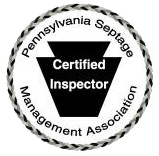- Septic Pumping and Repairs, Including Effluent Pump Replacement in Sand Mound Systems
- Serving All of Berks County plus parts of Chester, Montgomery, Lancaster, Lehigh and Schuylkill Counties
- Installation and Maintenance of Septic Systems
- Septic System Inspections in Real Estate Transactions, Hydraulic Load Tests, Wastewater Management and Consulting
- 4th Generation Expertise - Caring For Septic Systems Since 1935
Real Estate Inspections of Septic Systems
What Are Real Estate Septic System Inspections?
Real Estate Septic System Inspections are professional evaluations that analyze each component of a system, and the overall system's condition is rated as either satisfactory, satisfactory with concerns, unsatisfactory or more investigation is needed.
Real Estate Septic System Inspections are typically required by a potential buyer of a home. As a buyer, you obviously want to make a fully informed decision about the home you are purchasing. Buyers of homes with septic systems require confirmation that the home's septic system is operating as intended, and there are no hidden or unseen problems which may be very expensive to repair in the future. In addition, most mortgage companies require that the septic system pass an inspection as part of the loan approval process.
What Does An Inspection Entail?
A Real Estate Septic System Inspection confirms that all of the septic system components are functioning correctly: treatment tanks (number of tanks, size and condition), pumps and holding tanks, filters, distribution systems, dosing, lift, and siphon tanks, absorption systems, etc. As part of every Real Estate Septic System Inspection, we verify the age of the system, the system's maintenance history, as well as the current occupancy.
What Is A Hydraulic Load Test?
When a property is vacant for over 7 days, we strongly recommend performing a hydraulic load test. This test simulates the normal daily water usage in the home; showers, baths, toilets, washing machine, sinks, dishwasher, etc and confirms that the drain field can handle the amount of wastewater coming from the home.
The hydraulic load test determines if the absorption area can satisfactorily receive and allow to pass into the soil / environment the daily volume of sewage effluent that the prevailing regulatory authority assigns to a structure based on occupancy, number of bedrooms or other regulatory factors.
In a hydraulic load test, clean water is introduced into the system for two consecutive days to test the ability of the system to accept and disperse a volume of liquid equal to the calculated volume that is expected from the structure served / or a minimum calculated flow.
Even when individual septic components are found to be satisfactory (tank, baffles, pump, piping, alarm, etc), if a hydraulic load test is recommended but not performed, the inspector's overall findings will be that "more investigation is needed." It has been our professional experience that any lender or mortgage company that requires a septic inspection will not accept a finding of "more investigation is needed."
More information on Hydraulic Load Tests may be found at the Pennsylvania Septic Management Association website:
Scott Bailey Performs Our Real Estate Inspections
Each Real Estate Septic System Inspection is performed by Scott A. Bailey, the lead inspector and President of Bailey's Inspection Services and Berks Septic Service. Scott is trained and certified thru PSMA/NOF (Pennsylvania Septage Management Association). The PSMA standards have been described as the "industry standard," and these standards embody a protocol which, when fully applied, evaluates every component of the system.
Each Septic Inspection takes several hours to complete. We highly recommend you attend the inspection to familiarize yourself with the type of system and components that are located on the property. We will also provide recommendations on how to properly maintain your system in the future. Upon completion of the inspection a detailed report of the system at the time of the inspection will be sent to the client within 24 hours.
Call Us Today To Schedule A Real Estate Inspection
Call us today if you have any questions or would like to schedule a real estate inspection of a septic system, or a hydraulic load test.
(610) 621-6197
What Our Customers Are Saying
"Thank you for your prompt service and dedication to your work. The sellers have endured lots of issues getting their house ready for settlement and this one was especially challenging. I am always confident when you are in charge of a project - I can feel with certainty that it will be completed on time and within budget. Thank you Scott. You are the best!"
Randy Weeber, RE/MAX of Reading
GoBerksCounty
Read more customer testimonials on our We Get Letters page.















